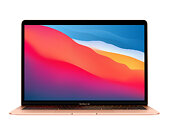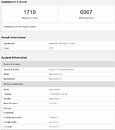Thursday, November 12th 2020

Apple's M1-Based MacBook Air Benchmarked
When Apple announced that they are going to switch their Mac lineup from Intel-based x86 processors to the custom "Apple Silicon," everyone was wondering how the new processors will look and perform. To everyone's luck, Apple has just a few days ago announced its first Apple Silicon custom processor for MacBook. The M1, as the company calls it, is their first processor designed for higher-power and performance tasks The M1 features eight CPU cores (four high-performance and four-high efficiency) paired with eight cores dedicated to the graphics. On the die, there is also a 16-core neural engine made to accelerate machine learning tasks found in the new applications.
Today, we are getting the first GeekBench 5 CPU benchmarks that showcase just how far Apple has come with its custom design. What we have is the M1 processor found in MacBook Air. This Mac model features a passive cooling system, cooling a CPU with a base frequency of 3.2 GHz. The system scored 1719 points in the single-core result, and 6967 points in the multi-core result. The single-threaded results measure itself with some of the highest-end offerings from Intel and AMD, while the multi-threaded results are very good given the mix and match of small and big cores.
Source:
GeekBench 5
Today, we are getting the first GeekBench 5 CPU benchmarks that showcase just how far Apple has come with its custom design. What we have is the M1 processor found in MacBook Air. This Mac model features a passive cooling system, cooling a CPU with a base frequency of 3.2 GHz. The system scored 1719 points in the single-core result, and 6967 points in the multi-core result. The single-threaded results measure itself with some of the highest-end offerings from Intel and AMD, while the multi-threaded results are very good given the mix and match of small and big cores.


117 Comments on Apple's M1-Based MacBook Air Benchmarked
My AMD Ryzen 3600X desktop is ST 1251 and MT 6973.
A laptop with AMD 4900HS is ST 1091 and MT 7075.
More: browser.geekbench.com/processor-benchmarks/
I guess at the beginning the software support might be limited, but this suddenly makes Apple's laptop a high performance option, especially at $999.
I had been discouraged by the fact that paying a premium for mac is giving me overpriced, outdated spec, guess this has changed now.
Every time other SoCs inch closer to Apple's the app gets updated and a chasm appears again between their chips and everyone else's.
In 4.4 there was less than 10% difference between A13 and Exynos 990, in 5 that somehow became a colossal 50%. This happens every single time a new version appears, without exception. Only an idiot would take these numbers for granted and not realize that this benchmark is always optimized specifically for Apple's chips.
I'm very curious about Cinebench R23 results of the M1.
I'm hopeful M1 will deliver. But a synthetic benchmark optimised for strange workloads where there are different codepaths depending on what CPU registers/functions are available, isn't going to cut it with me.
The different subscores come from very relevant performance metrics, like compression/decompression, h264, code compiling etc.
It's a integer benchmark.
"designed to test exclusively the integer performance of the system. "
AVX, AVX2, AVX512 is not included at all.
There’s been a lot of criticism about more common benchmark suites such as GeekBench, but frankly I've found these concerns or arguments to be quite unfounded. The only factual differences between workloads in SPEC and workloads in GB5 is that the latter has less outlier tests which are memory-heavy, meaning it’s more of a CPU benchmark whereas SPEC has more tendency towards CPU+DRAM.
I can only say that I'm really excited about the new M1 chips. As a lover of technology I'm all for new technology, and seeing people hate on a product they will never buy is beyond me.
PCMasterrace amirite?/s
Nearly all of those are completely irrelevant to real world workloads performed by your average user. Even for me, someone who knows what all of those tests entail it still means nothing.Huh ? Wouldn't it be strange if I were to hate on something that I will buy ? :kookoo:
For all we know hating on this, might be like hating on the iPhone when it was released.
i don't hate device itself, altought i am neither a fan of IOS and Mac OS, but i really hate Apple as a company. Their reps are a bunch of arroguant pricks that think you don't need what you think you need...
These chips are certainly impressive, but real world usage test will be needed. How much it consume? does it throttle ? etc..
Please elaborate.